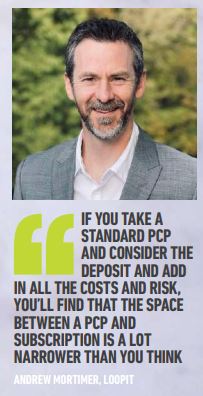 Car subscription has become a bit of a buzz phrase in the automotive space of late. But the ‘buzz’ does not look like it is only going to be a temporary fad. Boston Consulting Group (BCG) is predicting that subscriptions could reach £33 billion across the UK and US by 2030m, accounting for up to 15% of new car sales. That would be a sizeable chunk of business.
Car subscription has become a bit of a buzz phrase in the automotive space of late. But the ‘buzz’ does not look like it is only going to be a temporary fad. Boston Consulting Group (BCG) is predicting that subscriptions could reach £33 billion across the UK and US by 2030m, accounting for up to 15% of new car sales. That would be a sizeable chunk of business.
But is there space and the appetite in the market for what is, essentially, a mid-term rental business with baked-in flexibility?
Volvo has come out boldly with its own Care by Volvo subscriptions offering which accounted for 15% of the its total retail sales within 12 months of its 2021 launch. Jaguar Land Rover, BMW and Porsche, have also experimented in the car subscriptions space with offerings that have evolved and changed over the past few years. In addition, Hyundai launched Mocean 12 months ago and franchised dealers also have the ability to create a subscriptions package with their own stock to make sure they’re not missing out on what could be a new market development.
ICDP, the automotive distribution and retail consultancy, has been researching the automotive subscriptions and mobility market and has interviewed around 10 providers across Europe. Ben Waller, associate director of ICDP, tells AM that, while companies are still reluctant to talk specific numbers in terms of the popularity of subscriptions, they’re much more willing to talk now than they were five years ago.
Waller says: “When it comes to the mass market, we’re still in the awareness phase. Subscriptions are not a mainstream product yet, but that might change. It’s clear to me there’s a spot between the daily rental market and the three-year traditional lease which is probably under-explored.”
Subscription is also a pretty loose term. Care by Volvo, for example, offers terms at three months or 36 months, the latter being a lot closer to a standard personal contract hire (PCH). Mike Fazal, co-founder and chief executive at Karzoom, a business which facilitates automotive subscriptions for franchised dealers, believes the subscription market should be defined by having the flexibility to exit after a month, much like Netflix or Disney+.
 Hendy Group and Perrys are forging ahead as some of the first dealer groups in the UK to launch subscription offerings through Karzoom. Fazal says: “I think dealers are seeing Hyundai enter the space with Mocean, Care by Volvo and Kia Flex and they are thinking about how they can make sure they are a full service provider for customers.”
Hendy Group and Perrys are forging ahead as some of the first dealer groups in the UK to launch subscription offerings through Karzoom. Fazal says: “I think dealers are seeing Hyundai enter the space with Mocean, Care by Volvo and Kia Flex and they are thinking about how they can make sure they are a full service provider for customers.”
Waller says there has been a typical split between target customers for subscriptions so far. Some customers are waiting so long for their build-to-order new vehicle that putting them into a low commitment subscription can work as a good stopgap. It also bags the dealership a part-exchange for used stock. Subscription customers are 100% retained for servicing work.
Some subscriptions are being marketed as the perfect “toe in the water” for electric vehicles (EVs), serving as an extended, paid-for test drive to figure out if living with an EV is going to work or not. Businesses are also looking for flexibility, particularly in a time of recession. While fleets may be using traditional contract hire or outright purchase for the majority of vehicles, subscriptions also offer an alternative to daily rental.
Waller says: “Customer take-up is typically skewed to longer terms over three months and, in many cases, six and nine months. That means there’s demand for flexibility from the traditional three-year finance, but it’s not clear that people want to change their car every month.
“It’s also partly driven by the pricing. Start fees or deposits disincentivise shorter terms and flipping the cars regularly.”
David Betteley, community head – auto finance at Asset Finance Connect and chairman at car subscription software company Tomorrow’s Journey, thinks flexibility to more easily change a vehicle or exit a contract is at the heart of the attraction for subscriptions. He says: “I think consumers will be more worried in the next few years about entering into long-term, fixed-price contracts. Customers might be happier to pay a little more to have flexibility. There needs to be the right balance between flexibility and cost.”
There has been something of a disconnect between the headline price of a personal contract purchase (PCP) or PCH and direct comparisons with subscription costs. Car subscriptions often operate with total running costs included, including routine maintenance, breakdown, road tax and insurance, as well as EV extras like the ability to charge with public charging infrastructure. Total cost of ownership (TCO) is a pretty foreign concept to most retail customers, so there may be more education needed when introducing subscriptions.
Andrew Mortimer, executive chairman at Loopit, an automotive subscriptions software company, says: “If you take a standard PCP and consider the deposit and add in all the costs and risk, you’ll find that the space between a PCP and subscription is a lot narrower than you think.”
An XC40 mild hybrid through Care by Volvo is priced from £599 a month over three months. This includes seven day complimentary insurance, servicing, tyres and roadside assistance. This compares with around £487 a month for an XC40 on PCH, but customers would be locked in for four years. That’s £112 a month difference for the added extras and flexibility.
 Mortimer says: “There’s a middle ground needed on the pricing and finding a sweet spot. Dealers and lease companies have ways of acquiring vehicles sensibly and so I think there’s a big opportunity to utilise those vehicles through subscription at the right monthly price point for more mass appeal.”
Mortimer says: “There’s a middle ground needed on the pricing and finding a sweet spot. Dealers and lease companies have ways of acquiring vehicles sensibly and so I think there’s a big opportunity to utilise those vehicles through subscription at the right monthly price point for more mass appeal.”
It’s difficult to innovate without making mistakes. Waller says manufacturers are moving away from having a separate fleet specifically for subscriptions. He says: “Book by Cadillac, Access BMW, Porsche Passport, Mercedes Me and JLR Carpe have all pretty much gone.
“These high profile pilots offered access to a range of vehicles, paid for by a fixed monthly fee, which could be cancelled at a month's notice. They were expensive offerings per month for customers.
“The continuing experimentation in the subscriptions space suggests the market has a way to go before it matures.”
The emerging trend now is to offer an individual car at one price. That price then varies dependent on the term. One loud exit was Cazoo, which closed its subscriptions offering in June 2022 after acquiring Drover in the UK and Cluno in Germany. Mortimer doesn’t think Cazoo’s exit from the segment is a fair reflection of the subscription market as a whole.
He says: “Cazoo didn’t have the infrastructure like some lease companies and dealer groups do. If anything, it proved there is a demand for subscriptions as Cazoo still had or has a few thousand cars on the road.
“Those that launch high quality customer experiences with subscriptions could lead he market. I think companies such as Mycardirect are forging ahead because they’re getting it right.”
Betteley says Cazoo’s problem with subscriptions came down to considering subscriptions as a separate fleet. He says separating a fleet of vehicles just for subscriptions creates headaches to balance the utilisation of the vehicles. Betteley adds: “In order for subscriptions to work you need a platform that can handle incoming cars from various different locations and place them with different customers seamlessly.
“You need to get higher utilisation of vehicles, rather than just having a discrete fleet for subscriptions.”
There are third-party software services available that can help franchised dealers make subscriptions available from their existing stock for customers. Waller says that if dealer groups have enough scale, are already well versed in the fleet and rental space, then “having a go” at a subscription model is relatively low risk.
Mortimer says offering subscriptions is closer to the fleet and lease model, but that doesn’t mean it’s limited to dealers that are already working in that space. He adds: “The leaps that dealers have with that experience are smaller, but, as a dealer, you have the premises, you have the sales staff and valeters.
“You have all the component assets you need. If you have the right technology you can successfully manage a subscription business with one person for 250 cars on a subscription fleet.
“A couple of hours and a bit of training and you can have cars on the road relatively comfortably.”
Mortimer advises dealer groups to try 20 vehicles on subscription first to see how it beds in and works out before expanding. Fazal believes subscriptions are best suited to dealer groups that have a good level of scale and buying power.
He adds: “Dealers that take this on also have to know how they’re going to introduce this and communicate it with customers.”
New cars on subscription is "a recipe for disaster"
Asset Finance Connect’s David Betteley is not an advocate of offering new cars on subscription. He says: “Buying new cars and putting them into a discreet subscription fleet have seen massive depreciation on the vehicles and low utilisation. That’s a recipe for disaster.”
Betteley says nearly new to three-year-old vehicles is where the space is moving, particularly to reach a price point that could expand to a mass market.
He says: “If you’re into premium subscriptions it can be nearly new, but the mass market will be cars between three and six years old. At that age they’re still decent cars and relatively inexpensive to repair.”
Loopit’s Andrew Mortimer believes three-year-old vehicles are the sweet spot for vehicles in the subscription space. He says: “You can price accordingly for a nearly new, two-year-old or five-year-old vehicle. There can be flexibility around monthly prices based on those variables.
“I think there will come a time when dealer groups are going to auction and they will be identifying stock for used cars and other used vehicles that would be great on subscription.”
FCA could open the door to subscription innovation
The Financial Conduct Authority (FCA) is in the process of reforming the Consumer Credit Act (CCA) and this could pave the way for further innovation in the subscriptions space.
 David Betteley (pictured) says the FCA’s review of CCA “can’t come soon enough”. He says many CCA problems were highlighted during the pandemic when the Government allowed consumers to take payment holidays on their PCP and hire purchase (HP) agreements.
David Betteley (pictured) says the FCA’s review of CCA “can’t come soon enough”. He says many CCA problems were highlighted during the pandemic when the Government allowed consumers to take payment holidays on their PCP and hire purchase (HP) agreements.
Betteley says: “If you wanted to change things with the PCP or HP you had to terminate the contract entirely. That often meant finance houses had to send a letter to the customer to say they were in arrears.
“It was all in writing and it was distressing for consumers. There wasn’t a mechanism where you could take a fixed-price, long-term contract and amend that easily.”
Subscriptions are a rental product so they are not covered by the CCA. Betteley is urging the FCA to allow secure lending against a car or van with the ability for flexible payments. He believes that, once this is allowed, there will be a “massive proliferation” of subscription-type products covered by a new CCA.
He concludes: “I think we could see something where you have a three-year agreement, but you have something baked in that you could change your car once a year if circumstances change.”





















Login to comment
Comments
No comments have been made yet.